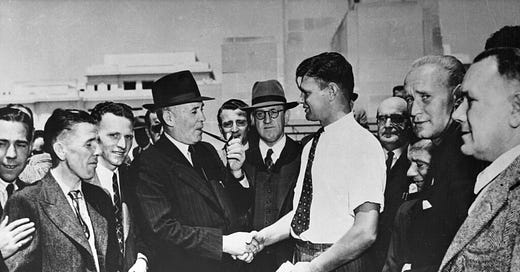Former Australian Wimbledon superstar, Evonne Cawley,0 today in her piece in the Australian, entitled “You’ve cheered for me, now please vote yes with me” is a heart rendering account of her struggles and triumphs growing up as a young Indigenous Australian.
There’s no doubt, Cawley’s story underscores the importance of the upcoming referendum and the significance of acknowledging the Indigenous Voice to Parliament.
Cawley’s story reflects her personal journey.
However, embedded in Australia are thousands of fascinating stories of culture, and history.
Australia’ isn’t short on narratives that have helped shape the country to become what it is now, and the men and women who were instrumental through their struggles.
The Snowyhydro Scheme and the men who stood shoulder to shoulder would have thousands of untold tales.
Among the tapestry of stories are those of Indigenous Australians, whose narrative has been intertwined with the larger Australian story for over 65,000 years.
The 1967 referendum was a pivotal moment in our nation's history.
That’s without question. The ’67 referendum was a moment in history which presented an opportunity to right history, with Australians coming together - unified to ensure Indigenous Australians were counted as citizens.
But like with all decisions of significance, it’s vital to engage with every side of the story and understand the broader implications.
The drive for constitutional recognition is admirable and, deeply personal, for many Indigenous Australians.
It represents the hopes and aspirations of an entire community. But this isn't solely about recognition.
It's about reengineering Australia's governance, making it vitally important, for all Australians to be cognisant of what all this means and the potential of Australia changing forever, if the ‘Yes’ vote succeeds.
The ‘Voice’ is an initiative demanding careful consideration.
While the ‘Voice’ aims to provide a platform for Indigenous Australians in legislative decisions, underlying its introduction is its execution and implementation.
And a separate voice could by its mere introduction unwittingly create divisions or further marginalise Indigenous communities. It's imperative that any representation system we adopt is holistic, ensuring that all Indigenous voices are heard and not just a select few.
The approach to closing the gap must be diverse. It's not only about recognition but ensuring access to quality education, healthcare, and economic opportunities.
Cawley's education program for Indigenous Australian children is proof direct actions can make an enormous difference.
And while constitutional recognition could be a step forward, it should be seen as part of a broader strategy, not the only solution.
The journey towards reconciliation will always be ongoing.
Mabo and Rudd’s Apology were significant, but they were also contentious and as Australia’s advances, as a country, Australia has to strive to engage in honest debate and conversation and working together rather than falling into the mire of divisive rhetoric.
The great strength of Australia is its multicultural diversity.
Australia’s history isn’t only about it being 65,000 years old; it's more than that.
It’s also about the stories of Australians who throughout many decades have migrated to Australia in search of a better life, escaping war torn Europe post World War 2.
Their stories are equally important and their struggles equally significant.
The historical value of migrant influence on Australia is significant to undervalue it is to discount and ignore why Australia is the country it is today.
Cawley's achievements on the tennis court are a testament to what can be achieved through perseverance and hard work.
Come October 14, everyone should reflect on how the strength of Australia lies in its unity.
Australians can’t just think about the past or the present, they have to think about what type of a future Australia they want and the shape it should take.
The referendum isn’t just about 'Yes' or 'No' it's about the legacy that will be left for future generations.
Everyone’s voice matters, not just Marcia Langton’s or Noel Pearsons and the city Indigenous elites.
And every perspective has a right to be heard.





There is simply not enough detail in the hoodwinking diatribe from the Yes campaign to warrant a change to our Constitution.
Eloquently stated. Great piece.